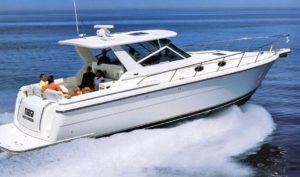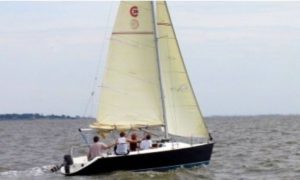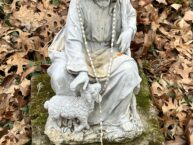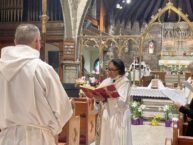 November 5, 2017 – All Saints Sunday: May God’s words alone be spoken, may God’s words alone be heard. Amen.
November 5, 2017 – All Saints Sunday: May God’s words alone be spoken, may God’s words alone be heard. Amen.
Most of you know that I grew up in Maryland, which is home to the largest estuary in North America – the Chesapeake Bay. It is a beautiful place, with one really long bridge over it, which, if you aren’t one to like bridges, can be terrifying. However, if you don’t mind bridges, it offers a breathtaking view of this magnificent body of water, which is home to a large number of marine species, plants, and also people who use the water for fun and fishing.
Now, about fifteen years ago, “on a clear summer Sunday afternoon in the middle of the Bay, a 25,000-pound powerboat ran into – and over – a sloop under sail. The powerboat was a Tiara 4000 Express with a top speed of 33 miles per hour. The sailboat was an ultralight  Colgate sloop, moving at about five miles per hour. It’s not hard to imagine who came out on top.
Colgate sloop, moving at about five miles per hour. It’s not hard to imagine who came out on top.
The powerboat hit the sailboat right smack in the middle, demolishing the cabin and partially submerging the sailboat. The crew of two on the sailboat were thrown into the water, and quickly rescued. The operator of the powerboat said he had not seen the sailboat. How can you not see a sloop with a 35-foot mast and raised sails?
What we have here is a clear case of a burdened vessel beating up on a privileged vessel.
For generations, skippers have used the terms “burdened” and “privileged” to define the status of two vessels encountering each other. The privileged vessel is the one that has the right of way – the right to proceed uninhibited by the other. The burdened vessel is the one that does not have the right of way, the one that must stay out of the way of the privileged vessel. For example, sailboats are privileged and motorboats are burdened, meaning that motorboats must yield the right of way to sailboats under sail. This obviously didn’t happen on that clear Sunday afternoon in the Chesapeake Bay.
While Jesus spent a fair amount of time on boats, he may not have been speaking in a nautical sense in the gospel today, but he knew all about privileges and burdens in a way that is very much in line with the rules of the sea”[1]
Jesus is talking about the leaders of his faith. They wear and do things that will draw attention to themselves, that will enhance their standing in the community, that will give them more power, all while preaching sacred Torah, our scripture, that implores us to be humble servants of God. Jesus was laying bare the hypocrisy that has creeped into the leaders of his faith, and imploring his followers to never forget who they really are. He tells them that the temple leaders say one thing, but do another.
Jesus is clear that what they are saying may be right, but those who follow him must also not just hear it, they must live it. He says, “The greatest among you will be your servant. All who exalt themselves will be humbled, and all who humble themselves will be exalted.” Or, for those who ride the seas – if you have more power, you must yield in support of those with less.
Oh, what a passage for today, because in a very real way, Jesus, as he is wont to do, is flipping our expectations of how the world works on its head. And at a time such as this, when our nation’s leaders seem tone deaf to the cries of the poor and the marginalized, when anger, hatred, bitterness, and greed become normative – almost expected, when humility is thought to be weakness and arrogance strength, this is a passage everyone needs to hear, inwardly digest, and outwardly live.
Because right now, the prophet Micah’s words we heard today, seem far too familiar to our modern ears when he speaks of those “who lead others astray, who cry “Peace” when they have something to eat, but declare war against those who put nothing into their mouths.” Today a prophet such as Micah might put it this way: “There are those in the seats of power, who stood on soap boxes claiming to hear the pain of their people, who pledged to serve them, to aid them in their plight, to work for the good of all – without regard for class, economic standing, gender, or any other way in which we place people into boxes. Yes, they spoke words such as these, and pledged to uphold the values of our nation – the nation of immigrants that welcome those others reject. Some do this work…but sadly, many do not.” The prophet was speaking about those who do not yield their power to aid the lowly, but run over them instead. Their lives are without truth, without love.
Or Jesus might put it this way: “We see those who lead people in worship, who claim to be servants of God, who wrap themselves in the trappings of teaching authority and stand in pulpits preaching the Word, but that Word is one that excludes LGBT people or women. There are those who wear crosses, while burning torches and shouting words of hate. There are those who kneel in prayer on the Sabbath, but during the week act with greed, contempt for the poor, ignore the outcast, and abuse creation. Do not do as they do, but as I teach you.”
Jesus does not reject that some people have authority, in fact he recognizes that there will be the need for this – he himself is a person of authority. What gets his tunic in a twist is those who are hypocrites – who say one thing, and do another. They abuse the authority they have for power over people. They have mistakenly seen privilege as belonging to those with more power – when it is more like the rules of the sea. Those with power are the burdened. Burdened with the responsibility that comes from being aware, of being true, of being authentic – of serving those who need to be privileged – who must be given the right of way – the least, the last, the lonely, and the lost.
The paradox (and isn’t it often that when it comes to Jesus, paradoxical ideas abound), is that this burden really isn’t a burden at all, once it is lived. It feels so very light and so very right, but the path to it – well, that can be quite difficult, because the great obstacles that get in the way are self-imposed – and we are often our own worst enemy.
You see, the burden of all people, especially people of faith, is to be authentic.
Authentic to who we are as children of God.
Authentic to our purpose in life.
Authentic in our deeds as well as our words.
Jesus is saying that power, as we often define it, is not power at all, not if it is lacking authority – real authority – the kind that comes from God. There are those with power, but it is meaningless because they have lost their authority. They are hypocrites – they either have forgotten who they are or no longer care, and are speeding along on the sea of life destroying all that they encounter. But Jesus makes it clear that real power comes with authentic authority, and that isn’t about amassing wealth, or high position in government or religious institutions. Real power doesn’t require an advanced degree, or special titles. Real power, authentic authority, is a burden that we freely take on, do not deny, and make our words match our deeds.
And the best part…to live it out, to be our authentic powerful selves, is more simple than can be imagined. It is as simple as being willing to see who we really are, and beyond the borders of own lives to what is all around us – waiting to be seen.
Remember what the motor boat operator said after demolishing the sail boat? He said he didn’t see it. This sailboat with a 35 foot mast – he didn’t see it. It wasn’t that he couldn’t see it – it was right there, in plain view, waiting to be seen. He wasn’t looking. He wasn’t paying attention. He was too self-absorbed to notice anything beyond the boundaries of his boat, his power boat.
What are we not seeing?
That is the question for us today, what are we not seeing, as we consider those saints who did see, and then acted out of their burden to be humbled before those they needed to privilege. People like Dorothy Day and Jonathan Daniels, like Frances Perkins and Oscar Romero, and like Harriet Beecher Stowe and Thomas Galludet, and those who gave up their lives for those they served, like the Dorchester Chaplains, saints of the sea.
To be clear, each of us in some way are both burdened and privileged, and it is so often true of the saints we celebrate that many did not come from places of wealth or ease of life, but were to others the smallest and least worthy of all the ships of the sea of life – they were the ones others were called to see, and who refused to be ignored. We know their authentic voices now – Martin Luther King, Jr and Harriet Tubman, Absalom Jones and Sojourner Truth. All of these, and many more, are in our book of the saints of the church. If you do not know them, get to know them – look them up – because they are examples of what it means to follow Jesus.
And the saints are also those who we love, but see no more. They touched our lives – saw us – loved us and we them. The saints are also those of our parish who gave of what they had to ensure that this would continue to be a place where we might be strengthened in our work, where those who tossed about on the sea of life are seen, are welcomed, and are loved.
These saints teach us all a mighty lesson – that this authority, this living our authentic lives, is not a thing of the rich and powerful – it belongs to each of us – and we must claim it! The song we will sing at communion, a favorite for children, says it so very well, that it is amazing that it was thought not theological enough to go into the hymnal. Thankfully clearer minds prevailed, as the verses speak such a truth to us all that sainthood is something we are – we just don’t always realize it, or live into it. I particularly love the third verse: “They lived not only in ages past, there are hundreds of thousands still, the world is bright with the joyous saints who love to do Jesus’ will. You can meet them in school, or in lanes, or at sea, in church, or in trains, or in ships, or at tea, for the saints of God are just folks like me, and I mean to be one too.”
We all should mean to be one too, because by our baptism, we are a saint of the church. The question is – do we live into that identity?
Today, as we do in our Stewardship Season, you will be given a gift blessed at the altar – it is a pencil – a #2 pencil in fact – like the ones we all had to use in school. Let it remind you first of your childhood – the vulnerability of being so small and dependent yearning to be seen, to be loved. For it is the children that Jesus says are closest to God – perhaps because they have not yet learned to close their eyes to the wonder of the world – they still see the other…that is, until they are taught to close their eyes.
 And may we also look on this pencil and remember – the pen may be mightier than the sword, but the lowly pencil has an eraser! In the preface to our book of saints, it says “In these saints we encounter not models of absolute perfection but men and women whose lives, with all their diversity of gifts and graces, were reshaped by God’s redemptive activity. May we take heart as we realize that, in spite of their failings and ours, we are all alike redeemed sinners called to be saints…”[2]
And may we also look on this pencil and remember – the pen may be mightier than the sword, but the lowly pencil has an eraser! In the preface to our book of saints, it says “In these saints we encounter not models of absolute perfection but men and women whose lives, with all their diversity of gifts and graces, were reshaped by God’s redemptive activity. May we take heart as we realize that, in spite of their failings and ours, we are all alike redeemed sinners called to be saints…”[2]
Remember that to live our authentic lives in Christ, Jesus tells us “All who exalt themselves will be humbled, and all who humble themselves will be exalted.” The mark of a saint of the church, of one who lives authentically, of one who humbles themselves, is the knowledge that we are not infallible. That we make mistakes. May this pencil, with its eraser, remind us that we are not perfect, nor should we try to be. All we must do is be who we were born to be, and that requires setting aside the desire to be anything other than a people who see, who love, who serve.
You see, Jesus wasn’t asking anyone to beat themselves up, or to feel unworthy – no. That isn’t humility, but like arrogance, it is a refusal to accept who we are – it is a lie that damages our own souls, and infects the lives of all we encounter. Humility, as Jesus is imploring us to wear upon our shoulders and in our heart, is not self-abasement, but truth seeking.[3] In the words of the late Rt. Rev. William Temple, former Archbishop of Canterbury, (whose Saint Day is Tomorrow), “Humility does not mean thinking less of yourself than of other people, nor does it mean having a low opinion of your own gifts. It means freedom from thinking about yourself one way or the other at all.”[4]
Archbishop Temple was right. The humility we are called to, as saints of the church today, is to understand how to love and serve – to seek authenticity in word and deed. It isn’t a life that is for those seeking perfection, or material wealth and power. It is for the pencil wielding – the ones who know that they aren’t perfect, but know too that isn’t what God asks of them. It is for folks like you and like me, who follow in the footsteps of the saints who have gone before – the ones who saw, loved, and served.
For our sake, and the sake of the world, may we live the life we are called to – the authentic life we gave ourselves over to in baptism, the authentic life we renew here at this church every time we worship together and receive the body and blood of the one whose own humility was an example to us all – that when our time here is done, we will leave a world better for our having lived in it – because we saw, we loved, we served – in truth and humility.
Amen.
For the audio from the 10:30am service, click here:
[1] https://www.homileticsonline.com/subscriber/btl_display.asp?installment_id=3132
[2] Holy Women, Holy Men, pg. X-XI, 2010. This has since been replaced by “A Great Cloud of Witness.”
[3] Bob Eldan of preachingtip wrote on this theme.
[4] William Temple, “Christ in His Church”
Rev. Diana L. Wilcox
Christ Church in Bloomfield & Glen Ridge
November 5, 2017
Pentecost 22 – Track 2 – All Saints Sunday
1st Reading – Micah 3:5-12
Psalm 43
2nd Reading – 1 Thessalonians 2:9-13
Gospel – Matthew 23:1-12






